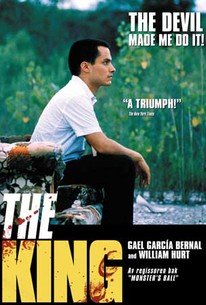“Absalom! Absalom!”

| None | Light | Moderate | Heavy | |
|---|---|---|---|---|
| Language | ||||
| Violence | ||||
| Sex | ||||
| Nudity |
What You Need To Know:
If there is redemption to be found in this movie, the authors have placed it strategically out of the story’s reach so that the ending may be read as either depraved or slightly less depraved. By banishing the possibility of repentance and forgiveness beyond the story, THE KING runs aground and fails to say anything human. The movie also contains some very strong foul language, sexual immorality and violence. Sin surely abounds in THE KING, but grace is largely banished.
Content:
(PaPaPa, C, AB, L, VVV, SSS, NN, AA, DD, MM) Very strong pagan worldview, some Christian elements including the pastor exhorting his congregation to “Get right with God” and a student giving a speech defending intelligent design, but in context these Christian elements are merely ironic or sardonic, plus actions of main character are strongly immoral with no redemption or true repentance depicted; seven obscenities including the “f” word; one scene of very strong explicit violence in which someone is stabbed and bleeds to death, implied killings, dead bodies, and someone is smothered with a pillow; three very graphic sex scenes in which the female portrayed is 16, depiction of oral sex, character fornicates with a prostitute; exposed female breasts and upper male nudity; light alcohol use; main character smokes in several scenes; and, characters who are accessories to murder pray for forgiveness but it’s just a formality, and repentance is never expressed.
More Detail:
THE KING stars gifted Mexican actor Gael García Bernal (THE MOTORCYCLE DIARIES) as Elvis Valderez, a young man recently discharged from the Navy who shows up at Pastor David Sandow’s thriving evangelical congregation in Corpus Christi, Texas. After the Sunday morning service, Pastor David (William Hurt), who looks as if he’s just stumbled off the set of a Western, learns the troubling news: Elvis is his son, the fruit of his lustful past.
What follows is a progressively more grim and lurid tale that plunges Pastor David’s family into the darkness of incest, deceit, rebellion, and murder. All of these plagued the family of another man named David. While the film’s allusion to Elvis Presley is obvious, THE KING might actually draw us back to the tumultuous life of Israel’s second sovereign.
Such is the state of biblical literacy today that this connection is all but completely lost on secular reviewers. Nevertheless, it is there. Here, as in II Samuel, the sins of the man of God return upon his household through the vile acts of his son. In the Old Testament, however, God spoke clearly through His prophets. One wishes for that kind of clarity here, for the judgment of the Lord to be rendered accurately, without ambiguity. Regrettably, there is no Nathan to deliver the crushing verdict, to assure us that neither God nor His justice is indifferent. Indeed, the filmmakers leave us very little with which to comprehend the horror.
Much of the film is spent quietly observing Elvis the way a nature film studies a black widow. The camera follows him and lingers on him, as if by looking long enough it will eventually penetrate his pleasant exterior to unmask his brooding, subterranean wrath, but the camera is powerless to see through his handsome charm. Elvis’s calculations and intentions elude our gaze, and he remains opaque and impenetrable. Indeed, Bernal’s good looks and charisma make Elvis that much more sinister. He persists as the dangerous riddle that mothers, and a lifetime of literature, have warned us about.
Since the family at the center of this drama are Christians, the movie certainly contains Christian elements. The son wages a campaign for the legitimacy of intelligent design at his high school, and the pastor talks about the need for repentance and forgiveness. At one point he even exhorts his congregation to “get right with God.” It would be too strong to say that these are held up to ridicule, but, in the context of the narrative, these depictions are mostly sardonic. Then, as if to shellac the whole thing in macabre irony, even as the movie grows darker, the score remains light and almost whimsical. Likewise, the pace is slow and meditative, but the threat of something terrible is ever-present. These tensions build to a devastating conclusion, but the film reduces itself to a bleak, ironic meditation on one family’s destruction.
If there is redemption to be found in this story, it has been placed by its authors strategically out of the narrative’s reach so that the ending may be read as either depraved or slightly less depraved. By sequestering the possibility of repentance and forgiveness beyond the scope of the story, THE KING runs aground and fails to say anything human, or divine. The movie also contains some very strong foul language, sexual immorality and violence.


 - Content:
- Content: 

